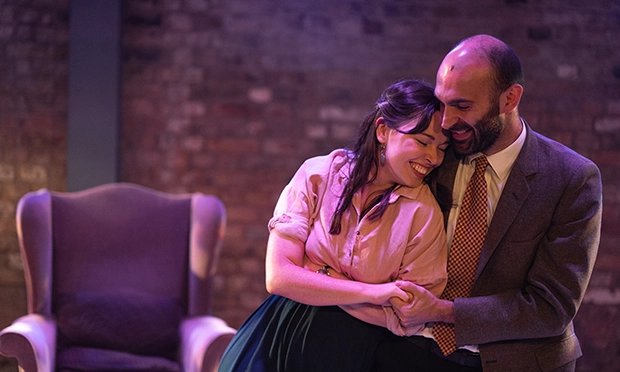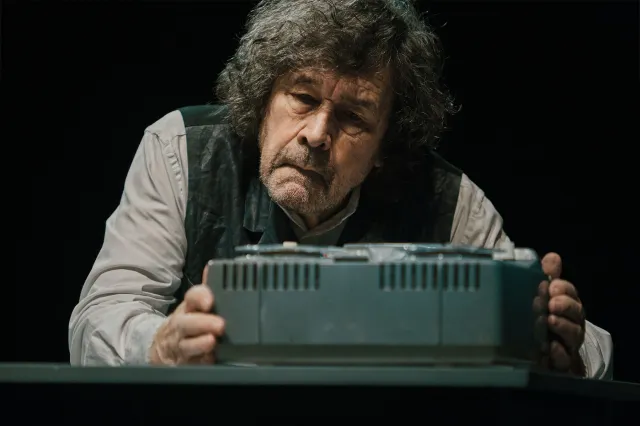Arcola Theatre ‘An astounding achievement’
According to the Social Care Institute for Excellence, there are 209,600 people diagnosed with dementia each year in the UK. My nan was one of them.
Matthew Seager’s perceptive play, In Other Words, pulls us into a couple’s microcosm, making us willing and, at times, unwilling spectators.
Arthur and Jane. Unremarkable, remarkable people. They meet at a bar in the 1950s, thrown together by a spilled glass of red wine and a love of Frank Sinatra.
This musical refrain follows them through their lives together and is a link that anchors the drifting ship of Arthur’s mind as he battles the effects of Alzheimer’s.
It’s burdensome stuff, but the expert direction from Andy Routledge gives a subtly unflinching script plenty of space to resonate.
Our couple break from recreating their life to discuss their feelings – a device that prevents the play getting too bogged down, while still allowing the tougher elements of the story to penetrate.
Two chairs, a lamp, some sharp lighting design, Lianne Harvey as Jane, and Seager as Arthur – all you need for a hit apparently.
It is undoubtedly a hit, gathering over 20 four- and five-star reviews since its premiere. As readers probably know, we don’t do stars in the Citizen, so this is me saying right here and now that this is a five-star show! Six if possible.
Important subject matter aside, almost every emotional arrow shot towards the audience is a bullseye.
Jane, the pragmatic lover and eventual carer of Arthur, is a softly hewn portrait. She never trips into melodrama, but she does crumble in a brutal scene in which she discusses her mental health with a doctor.
Both lead actors flick between younger and older versions of their characters in a non-linear, episodic format.
Jane is every overburdened mother, partner, and carer who has taken on more than they bargained for.
She desperately looks for flashes of recognition, snippets of songs that will pull her partner back across the rough waves of memory.
I have often expressed my view that people should never act in a piece they have written, but Seager proves me wrong. I will happily gobble my words in this case.
Arthur, a chirpy, cheeky chap, disintegrates before our eyes in a trajectory that is the most realistic and soul-rendering I have seen on the stage for a long time.
Both my mother and I watched the same illness gnaw away at my grandmother. The physical manifestation it can produce is so sensitively created by Seager that it took my breath away. It reminded me of something I try to keep buried.
The details are all in line here. Arthur wrings his hands into his eyes in frustration early on, and this gesture becoming more and more frequent throughout is so simple but so effective.
The pair’s relationship is painted before our eyes in the muted colours of the everyday, but it is shockingly beautiful – not an easy thing to do in a basement theatre. The many cups of tea, the telly, and use of their song by Sinatra, the ticking clock, and the waltz of a life shared.
Despite the wretchedness and the regular sniffles of other audience members, there is hope.
The focus on the transformative power of music and the importance of shared history is felt enormously.
Every member of the audience leaves feeling that this has happened in their own living room, to their own loved ones, and that is an astounding achievement.
It is another reminder of how fringe theatre can thrash the West End right out the park.
Arthur and Jane are co-commentators on their own fate, and we are right there, on the shaggy carpet, watching them dance into the evening as ‘Somewhere Beyond the Sea’ plays in the background.
We are involved, invested and, in my case, soaked with tears.



